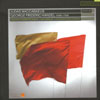Handel Judas Maccabaeus
Maccabaeus misrepresented, despite the conductor’s claims for its greatness
View record and artist detailsRecord and Artist Details
Label: Ambronay
Magazine Review Date: 8/2010
Media Format: CD or Download
Media Runtime: 0
Catalogue Number: AMY024

Author: David Vickers
This live recording made at the Ambronay Festival has some colourful slips in the English language from the international team of musicians (French-speaking Flemish choir, a Japanese Judas, Argentine soprano, mezzo, baritone and conductor, etc), but otherwise the choir scarcely puts a foot wrong and Les Agrémens play with panache. The pick of the soloists is Makoto Sakurada, who seems at ease in some of Handel’s most punitive tenor writing. Some other soloists fail to apply enough appoggiaturas, trills are only sporadic, and embellishment in da capos is almost negligible; Handel’s ad libitum instruction in “So rapid thy course” is ignored.
Alarcón hurries choruses that have slowish tempo markings, and the elongated rhythms of the unaccompanied choral iterations in “Mourn ye afflicted children” are irritating. If you blink you might not see the conqu’ring hero coming, but “Fall’n is the foe” is as striking as one would wish and the oratorio’s final “Hallelujah, Amen” is surprisingly (and, I think correctly) sweet and harmonious. Aberrational organ continuo abounds and there are several big cuts. “Pious orgies” is sung by the dark bass timbre of Alejandro Meerapfel (Handel always had it sung by a soprano; Alarcón also seems to add his own flute parts). The solo soprano opening of “Ah! wretched Israel” is supposed to be accompanied by a solo cello (with continuo) but we hear two cellos, playing mostly in parallel thirds (though the ensuing chorus is beautifully done); a spurious fanfare for three trumpets is inserted prior to “Sound an alarm”, as if to cast aspersion on Handel’s unleashing of the brass and drums midway through the number (the exaggerated slowing-down for the choir’s line “If to fall for laws” is clumsy). Handel’s specification for the first two vocal phrases of “Sing unto God” to be sung by soloists is disregarded. If Alarcón’s declared esteem for Judas Maccabaeus is genuine, then it is puzzling that his interpretation goes to such unnecessary lengths to compromise and misrepresent the score.
Discover the world's largest classical music catalogue with Presto Music.

Gramophone Digital Club
- Digital Edition
- Digital Archive
- Reviews Database
- Full website access
From £8.75 / month
Subscribe
Gramophone Full Club
- Print Edition
- Digital Edition
- Digital Archive
- Reviews Database
- Full website access
From £11.00 / month
Subscribe
If you are a library, university or other organisation that would be interested in an institutional subscription to Gramophone please click here for further information.




